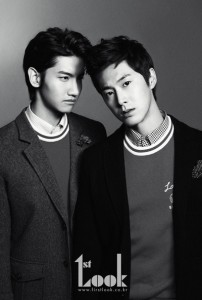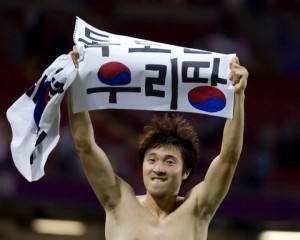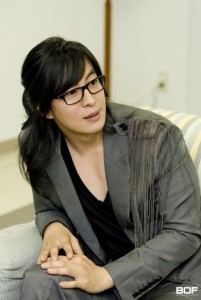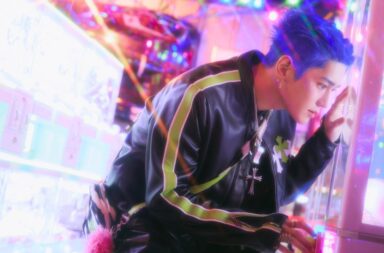 Bad news for Japanese fans of K-pop: the Japanese media is reporting that due to escalated tensions surrounding the Dokdo/Takeshima/Liancourt Rocks territorial dispute between the South Korean and Japanese governments, K-pop stars are not likely to be invited to Japan’s annual year-end music contest, NHK‘s Kohaku Uta Gassen. Last year, DBSK, KARA, and SNSD all made appearances on the program, and it was expected that their continued success on the Japanese archipelago would lend itself naturally to another appearance this year. However, in light of the growing anti-Korean sentiment, it looks as though they will be excluded. DBSK, whose career in Japan is perhaps even more profitable and well-known than is their career in South Korea, have been appearing on the program for years; that they, too, may be barred from appearing speaks to the fraught political situation.
Bad news for Japanese fans of K-pop: the Japanese media is reporting that due to escalated tensions surrounding the Dokdo/Takeshima/Liancourt Rocks territorial dispute between the South Korean and Japanese governments, K-pop stars are not likely to be invited to Japan’s annual year-end music contest, NHK‘s Kohaku Uta Gassen. Last year, DBSK, KARA, and SNSD all made appearances on the program, and it was expected that their continued success on the Japanese archipelago would lend itself naturally to another appearance this year. However, in light of the growing anti-Korean sentiment, it looks as though they will be excluded. DBSK, whose career in Japan is perhaps even more profitable and well-known than is their career in South Korea, have been appearing on the program for years; that they, too, may be barred from appearing speaks to the fraught political situation.
As mentioned, the current devolved political solution is largely attributable to the literally centuries-old dispute over a series of small rocky islets in the East Sea (also known as the Sea of Japan). Depending on whom you ask, the islets are either called Dokdo and belong to South Korea, called Takeshima and belong to Japan, or called the Liancourt Rocks and belong to we’re-not-getting-involved-sorry-guys (official USA position). The territorial issue is one of the most contentious and intractable conflicts between the two countries, and it has left a sour taste in the mouths of many Koreans and Japanese. Recall that just a few months ago, actress Kim Tae-hee came under fire for participating in a pro-Dokdo event in 2005 — a full six years before she appeared in the Japanese drama 99 Days With a Star. In 2010, tempers flared when Rie Akiba, a Japanese panelist on the South Korean television show MiSuDa (Chatting With Beauties), made ambiguous remarks regarding the islets’ ownership on Korean television. Some netizens even went so far as to suggest her removal from the program.
 Lately, old tensions have been aggravated by increased hype over the islands since the 2012 London Olympics. On August 10, South Korean president Lee Myung-bak made an unprecedented visit to the islets to counter what South Korea claims has been a much stronger effort on Japan’s part to advocate Japanese ownership — a move that, in turn, prompted Japan to remove the Japanese ambassador from Seoul in protest and anger. A few days later, immediately following the bronze medal Olympic soccer match between South Korea and Japan (South Korea defeated Japan 2-0), South Korean midfielder Jong-woo Park held up a sign that said “Dokdo is our land” (he was subsequently denied his Olympic medal for invoking politics into the Olympic Games). On August 23, South Korean officials refused a letter sent by Japanese prime minster Yoshihiko Noda regarding the territorial dispute and Lee Myung-bak’s visit, further weakening efforts at diplomatic resolution. And as though all of that weren’t enough, a whole slew of Korean celebrities — including Super Junior‘s Choi Siwon and members of the cast of 1 Day 2 Nights Joo Won and Kim Seung-woo (who actually filmed an episode on the islets) — came out in support of South Korea’s territorial claim.
Lately, old tensions have been aggravated by increased hype over the islands since the 2012 London Olympics. On August 10, South Korean president Lee Myung-bak made an unprecedented visit to the islets to counter what South Korea claims has been a much stronger effort on Japan’s part to advocate Japanese ownership — a move that, in turn, prompted Japan to remove the Japanese ambassador from Seoul in protest and anger. A few days later, immediately following the bronze medal Olympic soccer match between South Korea and Japan (South Korea defeated Japan 2-0), South Korean midfielder Jong-woo Park held up a sign that said “Dokdo is our land” (he was subsequently denied his Olympic medal for invoking politics into the Olympic Games). On August 23, South Korean officials refused a letter sent by Japanese prime minster Yoshihiko Noda regarding the territorial dispute and Lee Myung-bak’s visit, further weakening efforts at diplomatic resolution. And as though all of that weren’t enough, a whole slew of Korean celebrities — including Super Junior‘s Choi Siwon and members of the cast of 1 Day 2 Nights Joo Won and Kim Seung-woo (who actually filmed an episode on the islets) — came out in support of South Korea’s territorial claim.
Far be it from me, or any of us here at Seoulbeats, to come down on the issue (let me repeat that: we have nothing to say regarding the islets’ ownership and do not advocate on behalf of either side). Personally, I do not also have an opinion to express regarding South Korean celebrities’ decisions to take to the media to make their own stances on the issue known. But this whole debacle has, I believe, forced South Korea to re-evaluate the relationship between the expanding international market for South Korean popular and traditional culture and national security — and that is worth commenting on.
South Korean entertainment companies have made no secret of their intentions to expand beyond the narrow confines of the tiny South Korean market and into much larger (and potentially more lucrative) markets across Asia and even in Europe and the Americas. Indeed, the Korean Wave (known in popular parlance as Hallyu) has done remarkably well for itself in terms of spreading Korean entertainment far beyond South Korea’s shores. While there can be no question that the Korean Wave has generally been an economic boom for South Korea (from an increase in exports to Hallyu tour packages to a growing medical tourism industry), some have even put forth the idea that maybe the steady spread of Korean entertainment across the globe can work to South Korea’s advantage in terms of positvely influencing people’s impressions of South Korea and the Korean people. In other words, non-Koreans who find themselves falling in love with K-pop or Yonsama (the affectionate Japanese nickname for actor and Hallyu pioneer Bae Yong-joon) may be inclined to think more kindly of South Korea itself — thereby potentially smoothing over any historical animosities or current
prejudices that they may hold.
 As far-reaching as this idea may sound, it is actually a theory to which political scientists and political theorists have devoted a fair amount of interest. In political science literature, the theory that cultural exports can play an influential role in co-opting foreign audiences sans the use of force or economic clout is known as the concept of soft power. Developed by Harvard professor Joseph Nye in his works Bound to Lead: The Changing Nation of American Power and Soft Power: The Means to Success in World Politics, soft power places faith in culture, policies, and institutions to win “the battle for hearts and minds,” if you will. In contrast with traditional forms of “hard power” (think military prowess and economic might), soft power aims to produce acceptance of what may have been a previously hostile culture, thereby leading to acquiescence in terms of policy. The US government employed the heavy hand of soft power with particular urgency during the Cold War by sending American jazz bands to perform in countries that were seen as particularly vulnerable to Communism, in the hopes that they would be taken in by American pop culture and therefore reject the influence of the Soviet Union.
As far-reaching as this idea may sound, it is actually a theory to which political scientists and political theorists have devoted a fair amount of interest. In political science literature, the theory that cultural exports can play an influential role in co-opting foreign audiences sans the use of force or economic clout is known as the concept of soft power. Developed by Harvard professor Joseph Nye in his works Bound to Lead: The Changing Nation of American Power and Soft Power: The Means to Success in World Politics, soft power places faith in culture, policies, and institutions to win “the battle for hearts and minds,” if you will. In contrast with traditional forms of “hard power” (think military prowess and economic might), soft power aims to produce acceptance of what may have been a previously hostile culture, thereby leading to acquiescence in terms of policy. The US government employed the heavy hand of soft power with particular urgency during the Cold War by sending American jazz bands to perform in countries that were seen as particularly vulnerable to Communism, in the hopes that they would be taken in by American pop culture and therefore reject the influence of the Soviet Union.
Unsurprisingly, the Korean Wave has been oft-cited as South Korea’s strongest form of soft power, and indeed, almost nothing coming out of South Korea these days has the global reach as do K-pop and Korean dramas. And truth be told, Korean entertainment has probably done a good deal in terms of increasing international interest in South Korea; the incredible recent growth of Korean tourism and the number of students who currently cram into Korean language classrooms both in South Korea and abroad are nothing if not a testament to this. However, the potential decision to bar K-pop group from Kohaku Uta Gassen is nothing if not a testament to the fact that K-pop cannot and will not fix everything. Does this mean that K-pop has had no successes? Hardly; today’s Japanese youth is probably far more appreciative of South Korea than was the previous generation. But the happy consumption of Korean entertainment is still quite divorced from politicking and diplomatic maneuvering. No high-ranking government officials in either Japan or South Korea are likely to be persuaded to soften their stance on Dokdo/Takeshima because South Korean entertainment companies are making bank off of Japanese adolescents who have gone wild for SNSD.
Soft power may have a hand in making a younger global audience more amenable to Korean cultural products (and therefore more amenable to the idea of emptying out their wallets for the latest and ridiculously overpriced repackaged Super Junior album), but when it comes to the games that governments play, the power of the Korean Wave seems ill-matched to deal with high-priority issues of national security. One would do well not to forget that South Korea and Japan have a shared history plagued by deep mistrust and animosity (to put it lightly) — and unfortunately, it currently smacks of naiveté to hope that a bunch of young men and women wearing sparkly stage costumes and crooning in (often poorly-pronounced) Japanese will somehow patch up the wound or even staunch the flow of blood. These two countries have come a long way, but have a long way to go — and while the Korean Wave is no doubt building a bridge of cultural connectivity, it might very well be a bridge to nowhere when questions of power politics take center stage.
(E News World, The New York Times [1], [2], [3], Nate, The Huffington Post, Penny M. Von Eschen, Satchmo Blows Up The World: Jazz Ambassadors Play the Cold War (Cambridge: President and Fellows of Harvard College, 2004)


